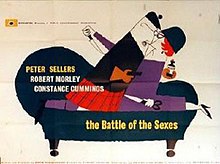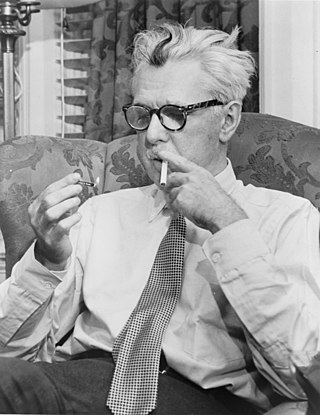
James Grover Thurber was an American cartoonist, writer, humorist, journalist and playwright. He was best known for his cartoons and short stories, published mainly in The New Yorker and collected in his numerous books.
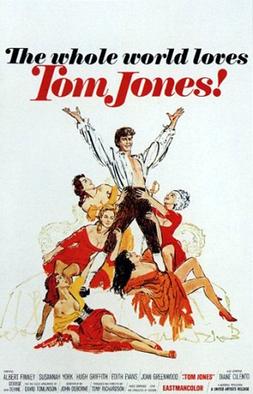
Tom Jones is a 1963 British period comedy film, an adaptation of Henry Fielding's classic 1749 novel The History of Tom Jones, a Foundling. It is directed by Tony Richardson from a screenplay written by John Osborne, and stars Albert Finney as the titular character. The cast also features Susannah York, Hugh Griffith, Edith Evans, Joan Greenwood, Diane Cilento, and David Warner in his film debut.

Joan Mary Waller Greenwood was an English actress. Her husky voice, coupled with her slow, precise elocution, was her trademark. She played Sibella in the 1949 film Kind Hearts and Coronets, and also appeared in The Man in the White Suit (1951), Young Wives' Tale (1951), The Importance of Being Earnest (1952), Stage Struck (1958), Tom Jones (1963) and Little Dorrit (1987).

Robert Adolph Wilton Morley CBE was an English actor who enjoyed a lengthy career in both Britain and the United States. He was frequently cast as a pompous English gentleman representing the Establishment, often in supporting roles. In 1939 he received an Academy Award nomination for Best Supporting Actor for his portrayal of King Louis XVI in Marie Antoinette.
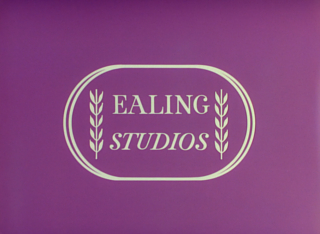
The Ealing comedies is an informal name for a series of comedy films produced by the London-based Ealing Studios during a ten-year period from 1947 to 1957. Often considered to reflect Britain's post-war spirit, the most celebrated films in the sequence include Kind Hearts and Coronets (1949), Whisky Galore! (1949), The Lavender Hill Mob (1951), The Man in the White Suit (1951) and The Ladykillers (1955). Hue and Cry (1947) is generally considered to be the earliest of the cycle, and Barnacle Bill (1957) the last, although some sources list Davy (1958) as the final Ealing comedy. Many of the Ealing comedies are ranked among the greatest British films, and they also received international acclaim.

I'm All Right Jack is a 1959 British comedy film directed and produced by John and Roy Boulting from a script by Frank Harvey, John Boulting and Alan Hackney based on the 1958 novel Private Life by Alan Hackney.

Rising Sun is a 1993 American buddy cop crime thriller film directed by Philip Kaufman, who also wrote the screenplay with Michael Crichton and Michael Backes. The film stars Sean Connery, Wesley Snipes, Harvey Keitel, Tia Carrere, Mako and Cary-Hiroyuki Tagawa. It was based on Michael Crichton's 1992 novel Rising Sun.
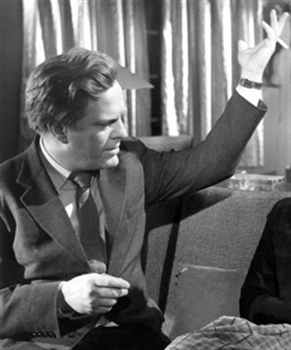
Seth Holt was a Palestinian-born British film director, producer and editor. His films are characterized by their tense atmosphere and suspense, as well as their striking visual style. In the 1960s, Movie magazine championed Holt as one of the finest talents working in the British film industry, although his output was notably sparse.
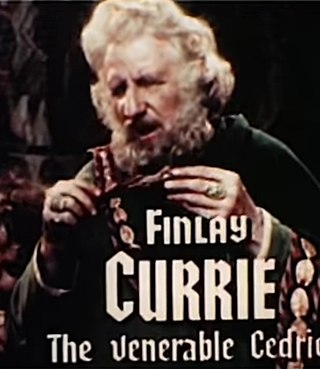
William Finlay Currie was a Scottish actor of stage, screen, and television. He received great acclaim for his roles as Abel Magwitch in the British film Great Expectations (1946) and as Balthazar in the American film Ben-Hur (1959).

Kidnapped is a 1960 American adventure drama film. It is based on Robert Louis Stevenson's classic 1886 novel Kidnapped. It stars Peter Finch and James MacArthur, and was Disney's second production based on a novel by Stevenson, the first being Treasure Island. It also marked Peter O'Toole's feature-film debut.

Whisky Galore! is a 1949 British comedy film produced by Ealing Studios, starring Basil Radford, Bruce Seton, Joan Greenwood and Gordon Jackson. It was the directorial debut of Alexander Mackendrick; the screenplay was by Compton Mackenzie, an adaptation of his 1947 novel Whisky Galore, and Angus MacPhail. The story—based on a true event, the running aground of the SS Politician—concerns a shipwreck off a fictional Scottish island, the inhabitants of which have run out of whisky because of wartime rationing. The islanders find out the ship is carrying 50,000 cases of whisky, some of which they salvage, against the opposition of the local Customs and Excise men.

Saturday Night and Sunday Morning is a 1960 British kitchen sink drama film directed by Karel Reisz and produced by Tony Richardson. It is an adaptation of the 1958 novel of the same name by Alan Sillitoe, with Sillitoe himself writing the screenplay. The plot concerns a young teddy boy machinist, Arthur, who spends his weekends drinking and partying, all the while having an affair with a married woman.

Jameson Clark was a Scottish character actor who appeared in 22 films and made many appearances on television.
Monja Danischewsky was a British producer and writer, born in Archangel into a Russian-Jewish family who left Russia for England in 1919 and who produced and wrote the films Topkapi and Rockets Galore! (1957) and others.
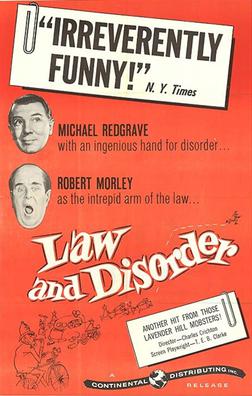
Law and Disorder is a 1958 British crime comedy film directed by Charles Crichton and starring Michael Redgrave, Robert Morley, Joan Hickson, and Lionel Jeffries. It was based on the 1954 novel Smugglers' Circuit by Denys Roberts. The film was initially directed by Henry Cornelius, who died while making the film. He was replaced by Charles Crichton.

Light Up the Sky! is a 1960 British comedy drama film directed by Lewis Gilbert and starring Ian Carmichael, Tommy Steele and Benny Hill. The film also features Dick Emery in a minor role.

The Boy Who Stole a Million is a 1960 British comedy thriller film directed by Charles Crichton who called it "pretty simple."

Bryanston Films was a British film company formed by Michael Balcon and Maxwell Setton in mid-1959 following the collapse of Ealing Studios. Neither a production studio, nor a distributor, it released independent British films through British Lion Films In operation until 1963, it was intended to be an unofficial group of independent film producers.

The Big Day is a 1960 black and white British "B" drama film directed by Peter Graham Scott and starring Donald Pleasence, Harry H. Corbett, Andrée Melly and Colin Gordon.
"The Catbird Seat" is a 1942 short story by James Thurber. The story first appeared in The New Yorker on November 14, 1942. The story was also published in the 1945 anthology The Thurber Carnival.
